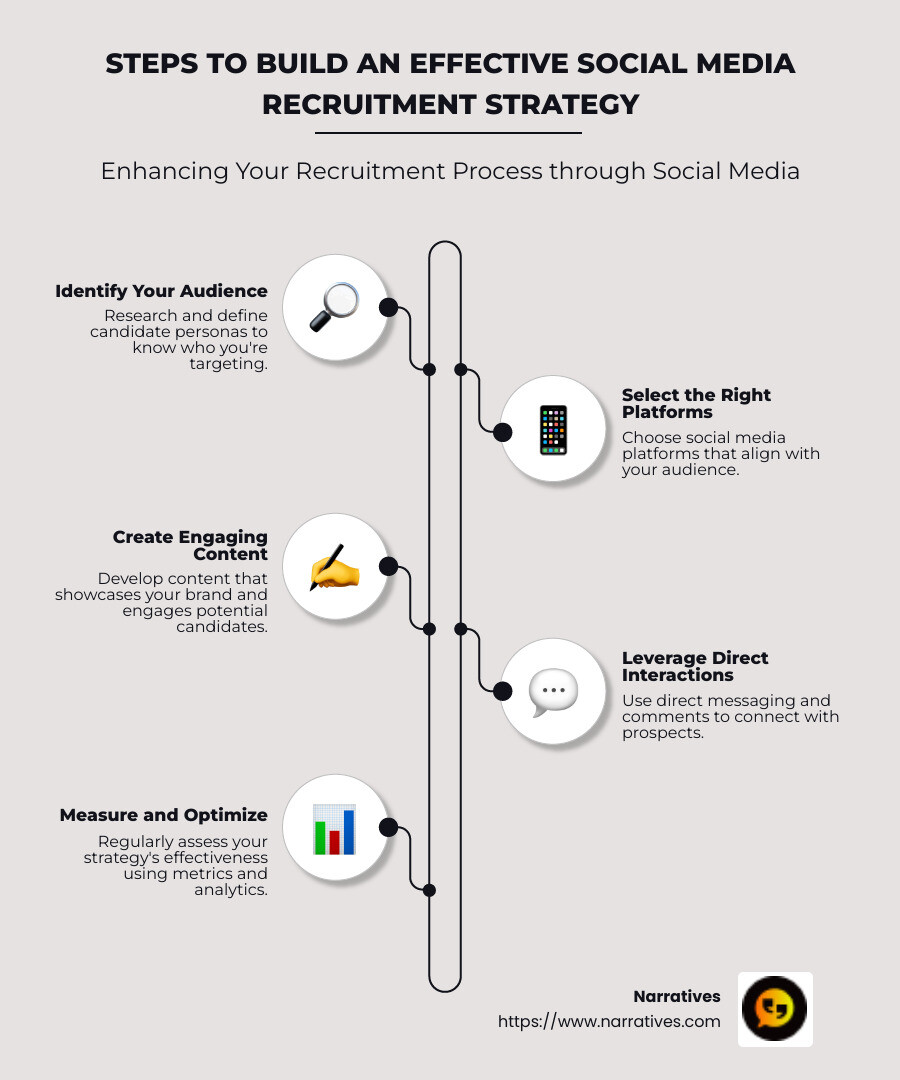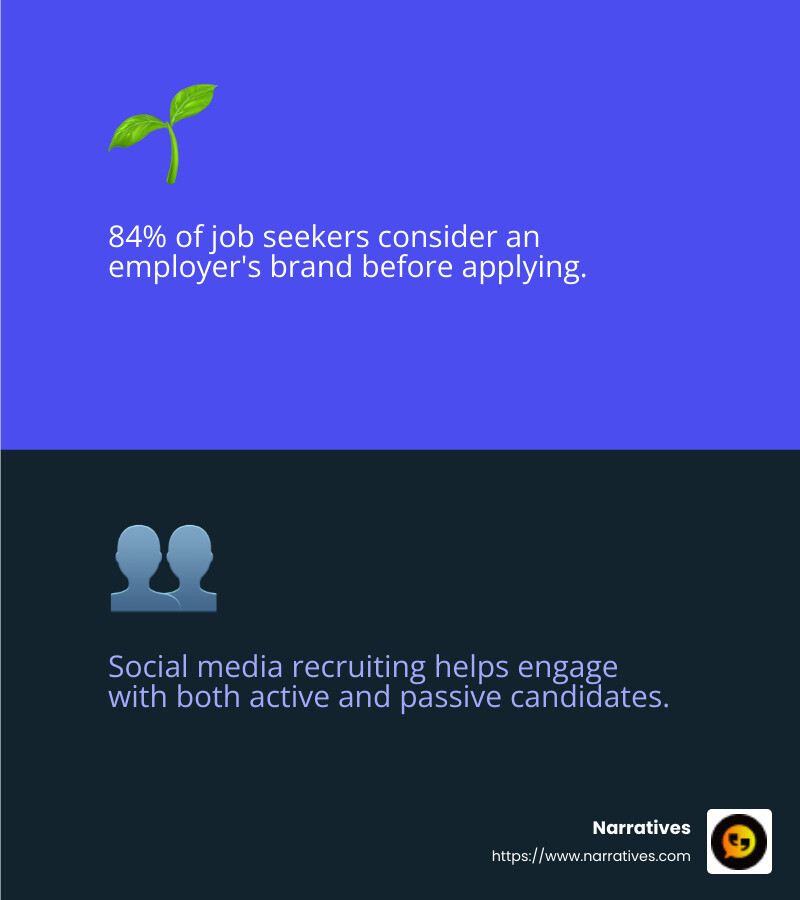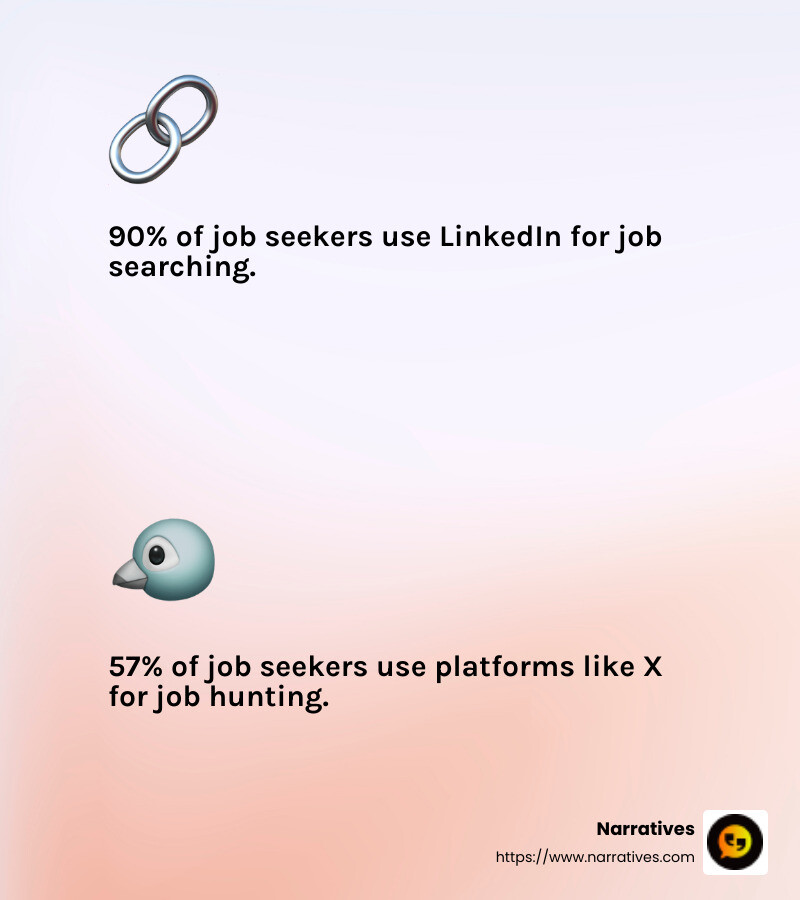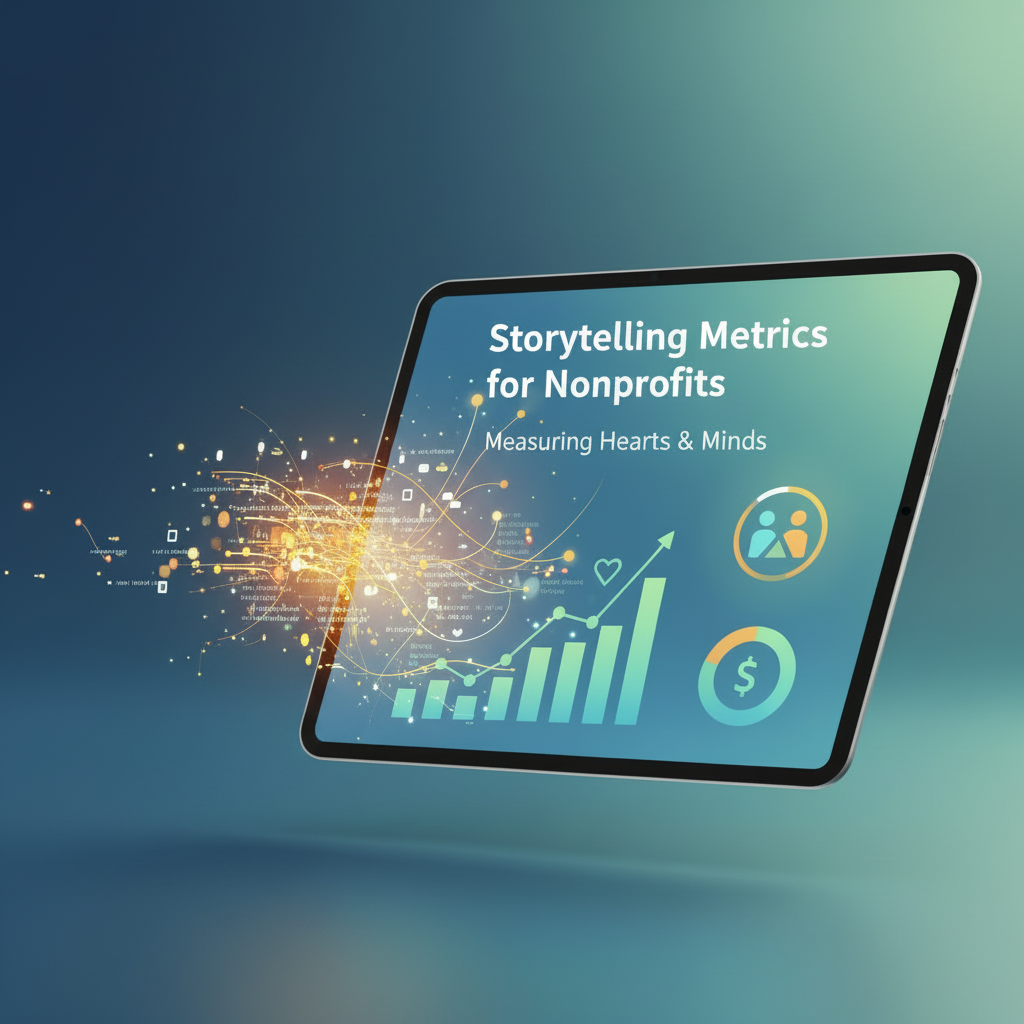From Likes to Hires: Crafting a Winning Social Media Recruitment Strategy

Social media recruitment strategy is the secret weapon that modern organizations wield to find the perfect candidates in today's digital job market. With billions scrolling through platforms like LinkedIn, YouTube, and Instagram daily, it's no wonder that recruiting through social media is not just a trend—it's a modern necessity. Recruiters can bypass traditional channels and tap directly into a pool of engaged, tech-savvy candidates who are waiting to explore new opportunities.
Here’s a quick breakdown of what makes a social media recruitment strategy crucial:
- Reach a diverse audience: Platforms like LinkedIn and Instagram let you connect instantly with varied demographics.
- Showcase your brand: Share your organization's culture and values through engaging content.
- Engage directly: Direct messaging and post interactions allow personalized connections with potential hires.
- Save time and cost: Efficiently screen candidates through interactive content and online portfolios.
For non-profits and mission-driven organizations, crafting a compelling narrative about your mission and values via social media can turn likes into genuine interest and eventually, hires.
Whether your focus is advocacy, DEI, or cultural storytelling, social media offers the tools for reaching and resonating with the right candidates.

Key terms for social media recruitment strategy:
- social media advertising
- social media content for marketing agency
- social media marketing agency services
Understanding Social Media Recruitment
Social media recruiting is a dynamic way to connect with both active and passive candidates where they spend much of their time—online. This approach combines aspects of employer branding and recruitment marketing to create a cohesive strategy. Let’s break down these elements to see how they work together.
Employer Branding
Your employer brand is the image your company projects to potential candidates. It's crucial because about 84% of job seekers consider an employer's brand before applying. A strong presence on social media helps showcase your company culture, values, and what makes your workplace unique. This is especially important for attracting Millennials and Gen Z candidates who seek companies that align with their personal values. Sharing employee stories and achievements can humanize your brand and make it more relatable.
Recruitment Marketing
Recruitment marketing is all about promoting your company as a great place to work. Social media platforms like LinkedIn, Facebook, and Instagram are excellent tools for this. They allow you to create engaging content that highlights your company’s strengths and opportunities. For instance, video content can be particularly effective on platforms like Instagram and TikTok. Each platform has its own vibe, so tailor your content accordingly.
The Power of Social Media Recruiting
Social media recruiting is not just about posting job openings. It’s about building relationships and engaging with potential candidates. By using direct messaging and participating in group discussions, you can create meaningful connections. Additionally, social media provides valuable insights into candidate behavior, helping you refine your recruitment strategy.
Overall, a well-crafted social media recruitment strategy can significantly improve your ability to attract top talent. It allows you to reach a broader audience, showcase your employer brand, and engage with candidates in a more personalized way.

By understanding and leveraging these elements, organizations can transform social media from a simple communication tool into a powerful recruitment asset.
Benefits of a Social Media Recruitment Strategy
Improved Marketing
Social media recruitment offers best immediacy and scalability compared to traditional methods. With about 90% of job seekers on LinkedIn and 57% using platforms like X, recruiters can reach a global pool of skilled candidates in seconds. This instant reach, combined with the ability to track page views, engagement, and followers, provides a data-driven approach to refine and focus recruiting efforts. 
Audience Segments
Each social media platform has its unique audience and culture. This allows recruiters to craft targeted messages for specific groups. For instance, Facebook and YouTube are excellent for reaching candidates with college education, while niche networks like GitHub or Reddit can help find specialized talent. By customizing your approach, you can narrow down the applicant pool early and focus on the most promising candidates.
Diverse Media Options
From text and images to videos and interactive content, social media offers a plethora of media options to engage candidates. Different content types perform better on specific platforms, so tailor your material. A compelling video on Facebook can be repurposed for Instagram, while an infographic might work well on LinkedIn. This flexibility allows you to maintain a consistent message while adapting to platform preferences.
Improved Employer Branding
A strong employer brand is crucial, with 84% of job seekers considering it before applying. Social media is a powerful tool to showcase your company culture and values. By sharing employee stories and company achievements, you can build a relatable and attractive image. This is particularly important for younger generations who prioritize alignment with personal values.
Broader Recruiting Reach
Social media expands your recruiting reach beyond traditional boundaries. By setting clear goals and using the right platforms, you can connect with a wider audience. Consistent employer branding and an easy application process increase the likelihood of attracting quality candidates. Encouraging current employees to act as brand advocates can further amplify your reach.
Candidate Insights
Social media provides valuable insights into candidate behavior and preferences. By monitoring engagement and feedback, you can refine your recruitment strategy and focus on what's working. This data-driven approach helps in understanding candidate motivations and tailoring your messaging to resonate with them.
In summary, a well-executed social media recruitment strategy not only broadens your reach but also improves your employer brand, allowing for more effective and targeted recruitment efforts.
Crafting Your Social Media Recruitment Strategy
Creating a social media recruitment strategy requires careful planning and execution. Here’s how you can build a robust approach:
Research Competitors
Start by studying your competitors. Identify which social media platforms they use and what kind of content they share. This helps you understand what works and what doesn’t in your industry. Look for gaps in their strategy that you can fill to attract top talent.
Tip: Analyze their engagement levels to see which platforms yield the best results.
Create Candidate Personas
Develop detailed candidate personas for the roles you need to fill. This includes understanding the skills, experiences, and personality traits that fit your company culture. Knowing your ideal candidate helps tailor your messaging and choose the right platforms.
Set Clear Goals
Define what success looks like for your social media recruitment efforts. Whether it’s increasing the number of quality candidates or reducing time-to-hire, having specific, measurable goals keeps your strategy focused.
Measure Metrics
Tracking metrics is crucial. Monitor traffic to your careers page, engagement rates, and completed applications. This data helps you see which strategies are effective and where adjustments are needed.
Choose the Right Platforms
Select platforms that align with your target audience. LinkedIn is great for professional networking, while Instagram and TikTok may appeal to younger demographics. It's not about being everywhere, but being where your potential candidates are.
Allocate Tasks
Divide responsibilities among your team. Assign roles for content creation, community management, and analytics. A clear division of labor ensures consistent and effective execution of your strategy.
Provide Training and Guidelines
Equip your team with the necessary training and guidelines. Ensure everyone understands the brand voice and the goals of your recruitment strategy. This consistency builds a stronger employer brand.
Optimize Over Time
Regularly review your strategy. Analyze what's working and what isn’t, and be prepared to make changes. Social media trends evolve quickly, so staying flexible and responsive is key to long-term success.
By following these steps, you can craft a social media recruitment strategy that not only attracts top talent but also strengthens your employer brand.
Next, we'll explore the top social media platforms for recruitment and how to leverage each one effectively.
Top Social Media Platforms for Recruitment
When it comes to crafting a winning social media recruitment strategy, choosing the right platforms is crucial. Each platform has its unique strengths and audience. Here's a look at the top contenders:
LinkedIn is the heavyweight champion of professional networking. It's perfect for connecting with like-minded professionals and showcasing your employer brand.
Why Use LinkedIn?
Most professionals are on LinkedIn, making it ideal for reaching a broad talent pool. You can join groups, use LinkedIn Recruiter, and send personalized messages to top talent.Success Story:
Google uses LinkedIn to share employee accomplishments and offer interview tips, creating a robust presence that attracts top candidates.
TikTok
TikTok is a rising star, especially among younger audiences. It's a platform where creativity shines through short videos.
Why Use TikTok?
With over 1.5 billion users, TikTok is ideal for showcasing company culture in a fun and engaging way. Highlighting employee stories and daily routines can attract a younger demographic.Success Story:
Chipotle uses TikTok to promote job perks like cooking lessons and educational benefits, linking directly to their careers page.
Facebook's massive user base makes it a valuable tool for recruiters. Its casual atmosphere offers insights into candidates' personalities.
Why Use Facebook?
It allows you to post job openings, join relevant groups, and engage with potential candidates through comments and messages.Success Story:
Accenture highlights employee journeys and shares job openings, creating a vibrant community on its Facebook page.
Instagram is all about visuals. It's popular with Millennials and Gen Z, making it a great platform for showcasing your brand's culture.
Why Use Instagram?
Use images, Reels, and Stories to create an engaging narrative about your company. Participate in trending topics with relevant hashtags.Success Story:
Salesforce shares employee interviews and event highlights, using Instagram to create a lively and relatable brand image.
X (formerly Twitter)
X is known for its brevity and immediacy, making it a go-to for news and events.
Why Use X?
Engage with candidates through hashtags and conversations. Pin important posts to keep them visible.Success Story:
UPS uses X to highlight employee stories with hashtags like #UPSers, making it easy for candidates to follow along.
YouTube
YouTube is the king of video content, perfect for detailed storytelling and showcasing your company.
Why Use YouTube?
Create in-depth videos about your company culture, employee testimonials, and job roles. Repurpose content from other platforms to maximize reach.Success Story:
Zendesk emphasizes its remote and hybrid work opportunities through recruitment videos, offering a glimpse into their work environment.
Each platform offers unique ways to connect with potential candidates. By understanding their strengths and tailoring your content accordingly, you can maximize your recruitment efforts.
Next, we'll dive into the best practices for social media recruiting to ensure your strategy is both effective and engaging.
Best Practices for Social Media Recruiting
To make the most of your social media recruitment strategy, it's crucial to follow best practices that optimize engagement and reach. Here's how:
Create an Editorial Calendar
An editorial calendar is your roadmap for consistent and engaging content. It helps you plan posts in advance, ensuring you cover all bases without the last-minute scramble.
Why It Works:
It keeps your content diverse and aligned with your recruitment goals. You can schedule posts around themes like employee stories, job openings, and company milestones.Pro Tip:
Leave room for flexibility. Social media trends change quickly, and your calendar should adapt accordingly.
Get Team Members Involved
Your team is your biggest asset in recruiting. Encourage them to share their experiences and company culture on their social profiles.
Why It Works:
Authentic voices resonate more with candidates. It builds a genuine image of your workplace.Pro Tip:
Provide pre-produced content to make sharing easy for your team. This ensures consistency in messaging.
Send Direct Messages to Candidates
Direct messaging is a personal way to engage with potential candidates. It's your chance to make a strong first impression.
Why It Works:
Personalized messages show candidates that you're genuinely interested in them, not just filling a position.Pro Tip:
Avoid the hard sell. Instead, express interest in their skills and align it with your company's values.
Comment on Candidates’ Content
Engaging with candidates' posts shows you're attentive and interested in what they have to say.
Why It Works:
It opens up conversations and demonstrates that you're approachable and interested in their insights.Pro Tip:
Encourage them to message you directly for deeper conversations.
Start Group Discussions
Platforms like LinkedIn and Facebook are rich with industry-specific groups. These are gold mines for finding engaged candidates.
Why It Works:
Participating in discussions builds your reputation and connects you with potential candidates.Pro Tip:
Share valuable insights or ask thought-provoking questions to spark engagement.
Shout Candidates Out
Tagging potential candidates in posts or responding to them publicly can start conversations and draw attention to your company.
Why It Works:
It increases visibility for both your company and the candidate, potentially drawing in more interested parties.Pro Tip:
Be genuine and relevant in your shout-outs to maintain authenticity.
By implementing these best practices, you can create an effective and engaging social media recruitment strategy. This approach not only attracts top talent but also builds a strong employer brand that resonates with potential candidates.
For more insights on leveraging media networks for recruitment, check out our media services.


